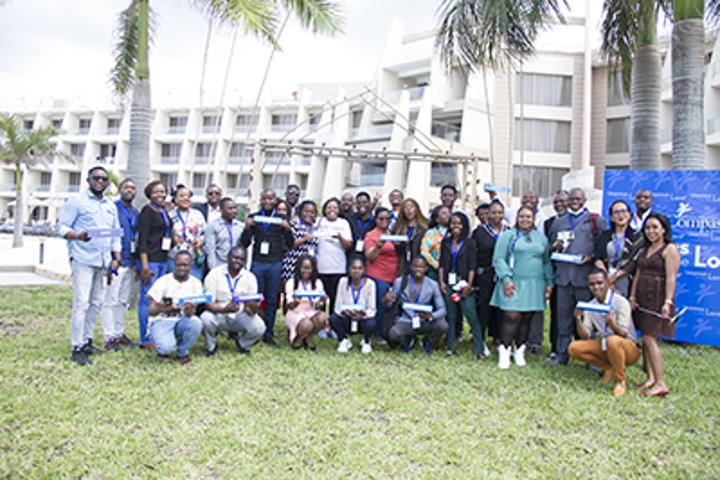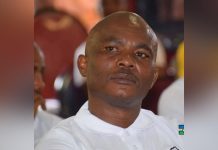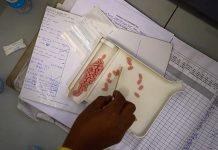Africa-Press – Lesotho. DAR ES SALAAM – The East, Central, and Southern Africa Health Community (ECSA-HC) Director-General (DG) Prof Yoswa Dambisya is resolute that conquering the fight against Tuberculosis (TB) requires concerted efforts by the media to make known the Secretariat’s work in fighting against this disease to the public.
Prof Dambisya expressed these sentiments during the regional workshop that was held under the auspices of ECSA-HC to capacitate the media practitioners with tools of the trade on reporting TB-related issues including TB in the mining sector.
The high-level training was held in Dar Es Salaam, Tanzania, and attracted health journalists from Lesotho, Botswana, Democratic Republic of Congo (DRC), Eswatini, Madagascar, Malawi, Mozambique, Namibia, Tanzania, Zambia, and Zimbabwe.
The ECSA-HC DG said it is through the media that the efforts of the Secretariat can be known far and wide across the Southern African Development Community (SADC) region.
He further made a call to action urging the journalists to spread awareness of the TB disease including in mining communities and engage the work of the Secretariat in the fight against this bacterial and contagious infection.
Although there have been some recorded breakthroughs in the fight against TB, this disease still continues to wreak havoc. According to the World Health Organization (WHO), about 10 million people fall ill with TB annually.
“Despite being a preventable and curable disease, 1.5 million people die from TB each year- making it the world’s top infectious killer,” reports the WHO.
The United Nations General Assembly on September 26, 2018, held a high-level meeting that was focused on the fight against TB under the theme, “United to end tuberculosis: an urgent global response to a global epidemic”.
Meanwhile, the Sustainable Development Goals (SDGs) aspire for an end to the epidemics of AIDS, TB, and similar water-borne and communicable diseases by 2030.
The TB Specialist in the TB in the Mining Sector (TIMs) under the SADC Secretariat Dr. C. Sandy Disease said that mining production is associated with TB incidence rates.
“Mining is a significant determinant of countrywide variation in TB among sub-Saharan African nations. Comprehensive TB control strategies should explicitly address the role of mining activity and environments in the epidemic,” he said.
He noted that the mineworkers are vulnerable to HIV infection due to unprotected intercourse, saying it increases the TB/HIV comorbidity. Dr. Sandy also highlighted that TB in the mining sector including the ex-mineworkers, communities, their families are at risk of contracting this disease.
Before standing treatment, ECSA-HC said attempts should be exhausted in ensuring that the drug sensitivity tests (DST) are done and resistance is ruled out.
“TB is treated with a standard 6-month course using four antimicrobial drugs that are provided with information, supervision, and support (directly observed treatment short course; DOTS) to the patient by a health worker or trained volunteer.
Without such support, treatment adherence can be difficult for the patient, leading to the spread of the disease & resistance. The majority of TB cases can be cured when medicines are taken regularly and for the complete prescribed duration.
“WHO recommends a collaborative TBHIV approach to reduce deaths, including actions for prevention and treatment of infection and disease. Affected people should be at the heart of the TB/HIV response.
The delivery of effective integrated TB/HIV quality care should be targeted within holistic systems for health; and under the umbrella of universal health coverage (UHC), ensuring the most vulnerable are reached and no one is left behind.
One of the attendants from Sonto Mlangeni from Eswatini TV said the training has assisted her and challenged her to broaden her horizons of knowledge in the reporting of the TB.
She said through the workshop, that she has borrowed a leaf from the books of fellow colleagues reporting on TB within the region. “Coming here really opened my eyes in terms of the impact that we journalists we have to make in our respective countries,”
Asked what some of the key takeaways she is taking home, she highlighted the networking and feasible future collaborations with the journalists within the region. CSA-HC, Manager Health Systems, and Capacity Development Dr.
Walter Denis Odoch said as the ECSA community, working on behalf of the Ministry of Health in the region urged the media to be active in their reportage on issues of TB.
He expressed comfort in the good working relations between journalists and the relevant actors in the fight against TB, including in the mining sector. Dr.
Odoch also pleaded with the officials of the Ministry of Health to open their doors to the journalists when they seek clarifications and information on what is done in effort to fight this disease.
Punctuated by the robust debate and engagements, the high-impact training resolved that there will be visible and concerted reporting on issues related to TB.
For More News And Analysis About Lesotho Follow Africa-Press






